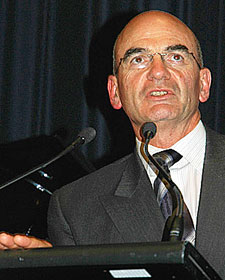 Anglicare CEO Peter Kell has announced a rescue plan for chaplaincy in the wake of fears voiced at Synod that the charity will no longer be able to afford to fund the ministry.
Anglicare CEO Peter Kell has announced a rescue plan for chaplaincy in the wake of fears voiced at Synod that the charity will no longer be able to afford to fund the ministry.
Mr Kell told the Synod on Wednesday afternoon that Anglicare will commit to financially supporting more than 22 full-time equivalent chaplaincy positions in 2006.
However, the amount of chaplaincy will be reduced by the equivalent of three full-time positions as a result of Anglicare's constrained budget.
Mr Kell says the decision was made after Anglicare underwent a "total organisational review of everything that we do".
"It was found that we needed to determine whether chaplaincy as a ministry was effective in contributing to the Diocesan Mission and the mission of Anglicare," he says.
"The Anglicare council endorsed the concept that Anglicare will vigorously continue chaplaincy ministry in the Diocese of Sydney in prisons, hospitals and mental health facilities."
Mr Kell's says he has no doubt about the value of chaplaincy given its ability to bring the "church into contact with people who have no other opportunity for contact with the church or the gospel".
"We found alignment with the Diocesan Mission because chaplaincy provides an opportunity for the church to penetrate structures in society that are otherwise largely outside the reach of the local church," Mr Kell says.
However, Mr Kell says the costs of the ministry had to be examined.
Anglicare's chaplaincy budget for 2005 totalled $2.7 million with total government subsidies totalling $1.2 million and money from Anglicare's general funds totalling $1.5 million.
"While figures have varied over the previous years, we have been successful in encouraging the government to increase funding. We have been successful in campaigning the NSW Department of Health and are receiving $460,000 from the government for hospital chaplaincy work," Mr Kell says.
Subsidies for chaplaincy from Anglicare's general funds varied over the last four years, according to Mr Kell. They totalled $1.6 million in 2002, rose to $1.9million in 2003, were reduced to $1.2 million in 2004 and rose to $1.5 million in 2005 due to increasing costs.
"The chaplaincy subsidy eats into the other work that Anglicare does. We had to balance our priorities," Mr Kell says.
"We are determined in 2006 and onwards to maintain a vigorous chaplaincy ministry but at a slightly reduced size."
Mr Kell says Anglicare will continue to seek other sources of funding and would continue talks with the government.
Mr Kell also announced that he and Anglicare’s Director of Chaplaincy, the Rev Graham McKay, have plans for building closer relationships between chaplains and parishes.
Mr Kell concluded his speech thanking the Synod and the Diocese for its continued interest in and support of Anglicare's work.
"I ask for continuing prayer for gospel opportunities for our chaplains and their work and for growing support of the Diocese for Anglicare's work."

























